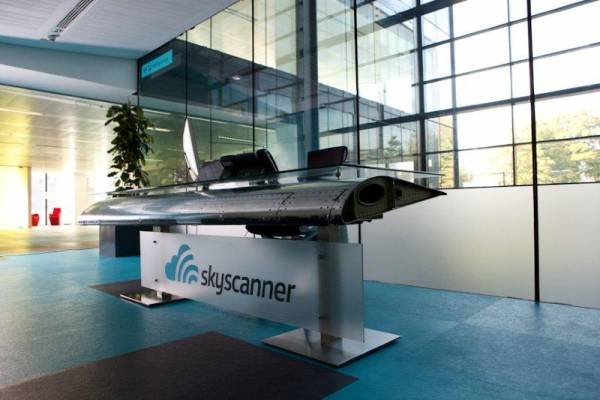
The great debate: Apple versus Android

By Kirsty Ireland, Skyscanner
Skyscanner HQ at Quartermile recently played host to what has become one of the great debates of the digital age: Apple versus Android.
It is a discussion that generally polarises people, including Skyscanner staff! Apple supporters claim that their devices are of superior quality whereas proponents of Android point to the fact that consumers vote with their wallets, with Android dominating the market share battle.
As a ‘Mobile First’ company, the importance of this debate is integral to Skyscanner’s outlook, as mobile represents the future of both travel search and booking. In recent years, Apple and Android have emerged as the two breakaway platforms, creating fierce competition between the two. While Windows and BlackBerry are still key players in the smartphone game, the dominance of Apple and Android has set them apart, as well as making them targets of each other’s scrutiny.
The debate in detail
Both Apple and Android had a Skyscanner representative to state its case: Chris Behr from design spoke on behalf of #teamApple, while Matteo Doni from engineering flew the flag for #teamAndroid.
#TeamAndroid kicked off proceedings by referencing Android’s vast advantage over Apple in terms of user numbers. The Android operating system dominates market share globally: its 78 per cent share of smartphone sales eclipses Apple’s modest 18 per cent slice of the pie. Matteo predicted that Android would be the most likely platform to gain the next billion Internet users worldwide, something Apple, with its more limited user numbers, was unlikely to be able to lay claim to.
#TeamApple contended that an operating system’s success should not be defined by quantity but by quality. Chris compared Apple products to a bespoke car: they may be fewer in number but have superior functionality, a greater ease of use and a ‘bells and whistles’ experience overall. This, he argued, is how Apple retains the loyalty of its customers and why consumers are willing to sacrifice more of their hard earned cash to own an Apple product. The same cannot be said for Android, with its fragmented structure, encouraging users to swap devices more frequently.
With questions opened up to the floor, Skyscanner staff asked both sides how their respective platforms would be addressing user privacy, in the wake of the recent compromised privacy issues with iCloud. Matteo argued that all consumers make a trade-off when they make use of free services on their platforms, but that the value of those services still outweighs the risks. Apple, Chris argued, despite the recent security controversy, still had the better track record when it came to ensuring the privacy of its users.
The teams also took a question about how each platform envisaged the socio-economic disparity between users of each platform. With the iPhone selling price now more than twice that of an average Android device, is Apple pricing out and alienating large sections of the global market? Matteo argued that Android’s more accessible price, reflected by its share of the market amongst wider sections of ‘ordinary’ people worldwide, made it the consumer champion and ‘phone of the people’. Chris, however, maintained that Apple do offer a more widely affordable product in the form of their iPhone 5C. In any case, it was pointed out that Apple need not offer lower-end devices in order to turn a profit. Despite having a diminishing market share due to Android’s more cost-effective mobile offerings, Apple remains the most profitable brand in the smartphone industry.
The closing statements
After a lively round of questions, both teams finished with their closing statements. Chris summarised Apple’s unique ideology: quality will always come before anything else, with each product representing something the company can truly be proud of.
Team Android closed by emphasizing its more flexible and accessible platform that is easy to develop for – a distinct advantage for companies hoping to release for an Android device.
Apple or Android?
Skyscanner’s staff held an anonymous vote to determine which operating system had won the day. The result was nail-bitingly close, with Apple gaining a narrow victory with 50 per cent of the vote to Andorid’s 48 per cent. The remaining two per cent opted out, perhaps choosing to retain their support for alternative brands.
In reality, Skyscanner’s commitment to being a truly ‘Mobile First’ company means we continue to commit and adapt to both operating systems with equal fervour. Mobile traffic now accounts for over half of all overall traffic to the site. Our successful free flights app is available for both iOS and Android, and has been downloaded over 30 million times across both platforms. We also recently released separate hotels and car hire apps, which are available for both Android and iOS.
Skyscanner is a leading global travel search site. With headquarters at Quartermile in Edinburgh, it provides instant online comparisons for millions of flights as well as car hire and hotels.



